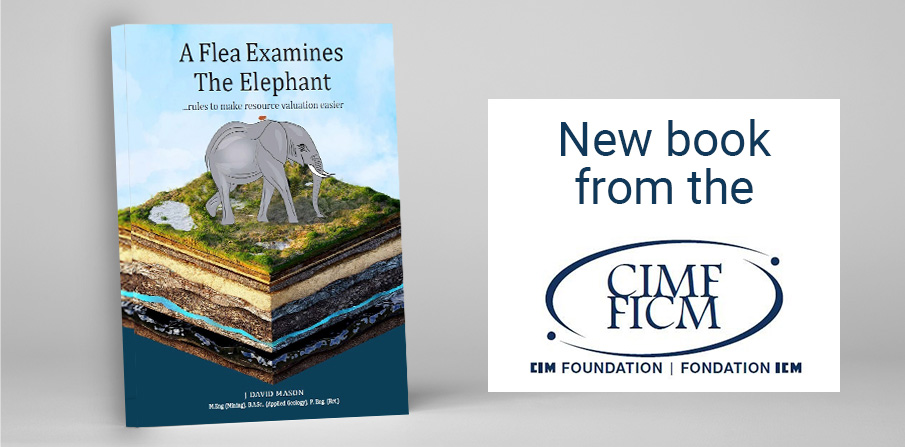Kelsey Rolfe - 11 April 2023
John David Mason was an undergraduate student in the University of Toronto’s applied geology program when Texas Gulf Sulphur announced a 600-metre drill core intersection at what is now the prolific Kidd Creek mine near Timmins, Ontario. The news of the intersection sent its share price rocketing skyward. Mason was baffled.
“The market was indicating the possibility of a multibillion-dollar mineral deposit based largely on the surface expression and this first significant drill hole result,” he recounts in his new book, A Flea Examines the Elephant: Rules to Make Resource Valuation Easier, published by the CIM Foundation. “I had no idea why the market would place such a high value on this deposit with so little information to assess it.”
Mason, who passed away of leukemia last November at the age of 82, ended up dedicating his career to the earliest stages of mining exploration. Throughout his career, he worked as a mining analyst, mineral economist, consultant and founder of investment firm Augen Capital, which focused on financing exploration-stage companies. Mason also founded Augen Gold Corp., a gold exploration company focused on the Swayze belt between Sudbury and Timmins, which was acquired in 2011 by a company that owned a neighbouring property.
He compiled the expertise he accumulated over his career – which he called his rules of thumb for early-stage assessments – in A Flea Examines the Elephant.
The book is aimed at resource analysts, geologists and investors, and provides guidelines for assessing the potential of a wide variety of deposit types, including volcanic massive sulfides, vein, copper porphyry, skarn, rare earth elements, diamond, oil and gas, placer and tailings deposits.
The book also contains general assessment rules for the value in the ground, production versus deposit size, a company promoter’s trustworthiness and legitimacy and the minimum deposit size for various metals; as well as metal price projections, investment analysis and valuation of metal royalty companies.
David Harquail, chair of the board of directors for Franco-Nevada Corp. and a friend of Mason’s for nearly 40 years, said the book should be a “bible” for mining analysts that follow exploration stocks to better understand how to value companies when they release drill intercept data. Harquail shared information on royalty companies with Mason for the book.
He praised Mason’s successes over the course of his career in identifying numerous exploration-stage companies with high-value deposits while he was a mining investor.
The junior exploration space, Harquail noted, is where some of the most colourful characters are found – and where it can be hard to get respect. But it is also where much of the money is made: news of an exciting discovery or promising drill intercept often leads to significant stock appreciation, taking a company from a $1 million market capitalization to a $30 million market cap.
“A lot of these things are hits and misses; they say only one in 1,000 prospects makes a mine, but he had a good success ratio because he was bringing some discipline to it, some science, versus some of the other promoters that were just promoting anything that they were long in.”
Harquail recalled Mason as someone who always had a smile on his face, and held a strong passion for the mining business that continued into his retirement.
“He lived and breathed it. He…just loved the speculative side, of what was the moneymaking potential of new discoveries, where was the wealth going to be created? And he devoted his whole life to that in various respects. You could feel that enthusiasm,” Harquail said, noting it was something the two men had in common. “He loved the romance of the mining industry.”
During his career, Mason travelled to properties across the world – from Canada’s far north to Latin America and the Middle East.
Mason penned A Flea Examines the Elephant in the midst of his illness, and hoped it would have a lasting impact on the industry. “He wanted to give back, and that’s what this book was about,” Harquail said. “He learned a lot of things…[that] aren’t taught in colleges or in textbooks, because it’s not the real engineering side of the business or the financial side of the business…and wanted to pass that on.”
Proceeds from book sales are being directed to the CIM Foundation’s to-be-launched Technical Professional Development Scholarship. The scholarship, which Mason hoped would reach at least $2 million in funding, is for mining professionals with roughly 10 years of industry experience who want training in advanced technology such as artificial intelligence. He said he hoped giving mid-career professionals the opportunity to develop new skills would contribute to the vibrancy of the industry.
“This book is my legacy for the next generation,” Mason wrote in a November email to Harquail.
For more information, please contact CIM Foundation manager Deborah Smith-Sauvé at dsauve@cim.org.
 - dev.png)


